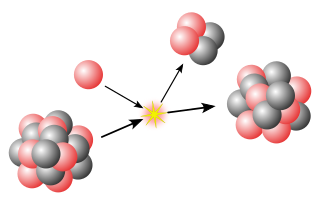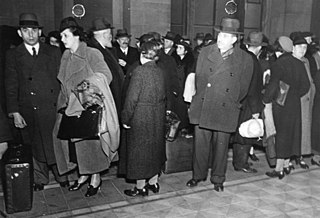 W
WThe Anschluss, also known as the Anschluss Österreichs, refers to the annexation of Austria into Nazi Germany on 12 March 1938.
 W
WThe Blomberg–Fritsch affair, also known as the Blomberg–Fritsch crisis, was the name given to two related scandals in early 1938 that resulted in the subjugation of the German Armed Forces (Wehrmacht) to dictator Adolf Hitler. As documented in the Hossbach Memorandum, Hitler had been dissatisfied with the two high-ranking military officials concerned, Werner von Blomberg and Werner von Fritsch, and he regarded them as too hesitant towards the war preparations that he was demanding. Hitler took further advantage of the situation by replacing several generals and ministers with men more loyal to him.
 W
WThis is a list of the largest companies of Nazi Germany by employees in 1938.
 W
WThe Eternal Jew was the title of an exhibition of anti-Semitism displayed at the Library of the German Museum in Munich from 8 November 1937 to 31 January 1938. The actual displays, with photographs and caricatures, focused on antisemitic canards in presenting the Jewish attempts at bolshevising Nazi Germany. It was best exemplified in the exhibition poster presenting an 'eastern' Jew wearing a kaftan and holding gold coins in one hand and a whip in the other. The exhibition attracted 412,300 visitors, over 5,000 per day.
 W
WIn nuclear physics and nuclear chemistry, the fission barrier is the activation energy required for a nucleus of an atom to undergo fission. This barrier may also be defined as the minimum amount of energy required to deform the nucleus to the point where it is irretrievably committed to the fission process. The energy to overcome this barrier can come from either neutron bombardment of the nucleus, where the additional energy from the neutron brings the nucleus to an excited state and undergoes deformation, or through spontaneous fission, where the nucleus is already in an excited and deformed state.
 W
WThe Kindertransport was an organised rescue effort that took place during the nine months prior to the outbreak of the Second World War. The United Kingdom took in nearly 10,000 predominantly Jewish children from Nazi Germany, Nazi-occupied Austria, Czechoslovakia and Poland, and the Free City of Danzig. The children were placed in British foster homes, hostels, schools and farms. Often they were the only members of their families who survived the Holocaust. The programme was supported, publicised and encouraged by the British government. Importantly the British government waived all those visa immigration requirements which were not within the ability of the British Jewish community to fulfil. The British government put no number limit on the programme – it was the start of World War II that brought the programme to an end, at which time about 10,000 kindertransport children had been brought to the United Kingdom.
 W
WKristallnacht or the Night of Broken Glass, also called the November Pogrom(s), was a pogrom against Jews carried out by SA paramilitary forces and civilians throughout Nazi Germany on 9–10 November 1938. The German authorities looked on without intervening. The name Kristallnacht comes from the shards of broken glass that littered the streets after the windows of Jewish-owned stores, buildings and synagogues were smashed. The pretext for the attacks was the assassination of the German diplomat Ernst vom Rath by Herschel Grynszpan, a 17-year-old German-born Polish Jew living in Paris.
 W
WThe Munich Agreement or Munich Betrayal was an agreement concluded at Munich on 30 September 1938, by Nazi Germany, the United Kingdom, the French Third Republic and the Kingdom of Italy. It provided "cession to Germany of the Sudeten German territory" of Czechoslovakia. Most of Europe celebrated the agreement, because it prevented the war threatened by Adolf Hitler by allowing Nazi Germany's annexation of the Sudetenland, a region of western Czechoslovakia inhabited by more than 3 million people, mainly German speakers. Hitler announced it was his last territorial claim in Europe, and the choice seemed to be between war and appeasement.
 W
WPolenaktion was the arrest and expulsion of about 17,000 Polish Jews living in Nazi Germany in October 1938. These deportations, ordered by SS officer and head of the Gestapo Reinhard Heydrich, displaced thousands of Polish Jews along the Germany-Poland border.